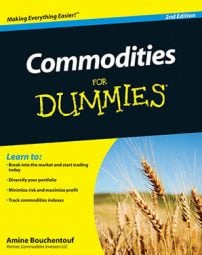Think of it this way: If commodities were a place, futures and options would be the vehicle you’d use to get there. In addition to commodities, futures and options allow you to invest in a variety of other asset classes, such as stocks, indexes, currencies, bonds, and even interest rates, often referred to as financial futures.
In Wall Street lingo, futures and options are known as derivatives because they derive their value from an underlying financial instrument such as a stock, bond, or commodity. However, futures and options are different financial instruments with singular structures and uses.
Futures and options conjure up a lot of apprehension and puzzlement among investors. Most investors have never used them, and the ones who have often come back with stories about losing their life savings trading them. Their negative aspects are slightly exaggerated, but trading futures and options isn’t for everyone.By their very nature, futures and options are complex financial instruments. It’s not like investing in a mutual fund, where you mail your check and wait for quarterly statements and dividends. If you invest in futures and options contracts, you need to monitor your positions daily — or even hourly. You have to keep track of the expiration date, the premium paid, the strike price, margin requirements, and other shifting variables.
That said, understanding futures and options can be beneficial to you as an investor because they’re powerful tools. They give you leverage and risk-management opportunities that your average financial instruments don’t offer. If you can harness the power of these instruments, you can dramatically increase your leverage — and performance — in the markets.
The futures markets are only one way for you to get involved in commodities. Because they’re fairly volatile, it’s important that you have a solid understanding before you jump in.
Although several books deal specifically with futures and options, check out Options Trading For Dummies, 4th Edition.For a comprehensive list of money managers who specialize in helping investors invest in the futures markets, check out Commodities Investors LLC.

